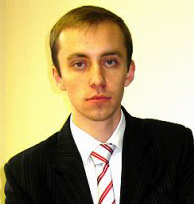Organised and coordinated through social networks, mass protests and demonstrations in Tunisia, Libya, Egypt, and Morocco began after the calls on the Internet. Maybe that is why the Belarusian authoritarian officials see social media as a menace and try to eliminate groups and communities that might threaten existing regime.
 On 3 June, the KGB officers visited Siarzhuk Pauliukevich (left), the administrator of community “We Are For Great Belarus” and the organiser of “Millions March” event in Vkontakte.ru – the most popular social network in Belarus. The officers confiscated Siarzhuk’s computer and took him to the KGB office where they demanded to delete the group. Pauliukevich simply turned off all features of the group, and is planning to revive it later.
On 3 June, the KGB officers visited Siarzhuk Pauliukevich (left), the administrator of community “We Are For Great Belarus” and the organiser of “Millions March” event in Vkontakte.ru – the most popular social network in Belarus. The officers confiscated Siarzhuk’s computer and took him to the KGB office where they demanded to delete the group. Pauliukevich simply turned off all features of the group, and is planning to revive it later.
The community was organising “Millions March” for the resignment of Aliaksandr Lukashenka, the country’s authoritarian ruler. The participants encouraged the public to start it on 15 July on the central square of Minsk. The community “We Are For Great Belarus” united more than 120 000 participants (out of 9.9 million population of Belarus).
The KGB officers warned Siarzhuk not to engage in this “nonsense” and if he did not stop calling upon people to protest on the streets, he could face Article 342 of Criminal Code.
‘Foul language’
Around midnight of 3 June, the KGB officers also visited the apartment of Zmitser Niafiodau – one of the administrators of “Revolution via Social Network” Vkontakte group. The group was created to raise awareness about the civic action on the Minsk central square to be held on 15 July. The organisers are calling upon the society to join the action and to show how many people want changes. No violent actions are planned or discussed.
As a friend of Niafiodau said, the search was rather superficial as the main aim of the KGB officers was to seize his computer. During the search, an administrative report for alleged foul language was drawn up on Zmitser.
However, during the trial, judge Mikalai Balauniou noted the divergence between the time noted in the report when Zmitser was allegedly cursing and actual time of the search. The judge had to direct the case back to Prosecutor’s office for improvement. The civic activist was released in the courtroom.
Attack as an advertisement
The specialist on social networks Aliaksei Liavonchyk claims that the total control and bans will not solve the problem as it is not that easy to delete a group.
“First of all, a group can be renewed. Secondly, the removal of a group is a kind of an advertisement, that would urge people to unite in other communities.
Basically, I don’t see a problem here. One can delete a group, but there is a number of such political groups on Vkontakte – a dozen or so, that are naturally not as big. That is why the people will just spread to other groups.”
Listen – and do the opposite
It is important to note that the activi sts were detained after the OSCE Representative on Freedom of Media Dunja Mijatović (left) said that in the 21st century access to the Internet is the foundation for pluralism and free media, and there can be no justification for government regulations to impede Internet access.
sts were detained after the OSCE Representative on Freedom of Media Dunja Mijatović (left) said that in the 21st century access to the Internet is the foundation for pluralism and free media, and there can be no justification for government regulations to impede Internet access.
“The Internet provides unparalleled opportunities to enhance free expression and pluralism. It is an essential element to build and strengthen democracy,” said Mijatović after signing the Declaration on Freedom of Expression and the Internet in Budapest.
Related articles
Media as a scapegoat for economic crisis in Belarus
Belarus: protesters tried, journalists beaten, rights defenders expelled


